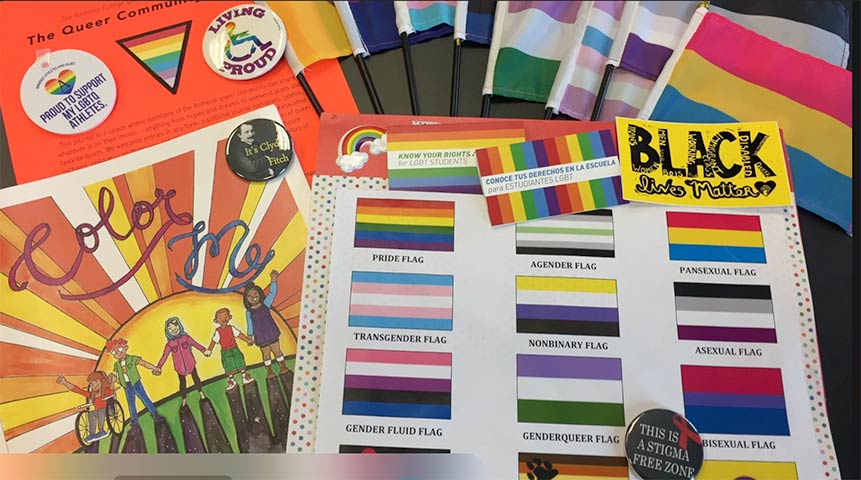
As Pride Week 2018 drew to a close on Saturday, April 14, graduates from the classes of ’04 to ’17 returned to Amherst to reconnect with the campus, current students and one another. According to Jxhn Martin, director of the Queer Resource Center, the LGBTQ+ Connections celebration was the first College-organized gathering for queer and transgender alumni outside of reunion, and they hope to make it an annual tradition.
The day began with a discussion among the alumni, guided by Martin, in the QRC. Sebastian Merrill, assistant director of Alumni and Parent Programs, talked about initiating the Connections event and answered questions about his office’s increasing efforts to encourage alumni to opt in to various affinity groups through the alumni directory—including those related to gender and sexual orientation—and to mentor current students.
The discussion turned to the alums’ memories of queer spaces and groups on campus: how, for instance, the Rainbow Room in the basement of Morris Pratt dorm moved to the basement of Morrow, before taking its place as the QRC (alongside the Multicultural Resource Center and the Women’s and Gender Center) in Keefe Campus Center. Martin spoke about the new LGBTQ+ themed residential space on the fourth floor of Moore, to be named this fall in honor of activist Sylvia Rivera.
The alumni were curious about current students’ experiences and new developments around campus. Luckily, student staff members of the QRC soon arrived to take them on a tour.
The afternoon brought a “Life After Amherst” panel discussion in Ford Hall. The alumni panelists talked about their careers in journalism, health care and the sciences, and about the complexities of coming out to families, friends and colleagues. “I’ve never regretted being more truthful with the people I love,” said Cara Giaimo ’11, adding that her increasing social and political activism after college were more challenging for her family to accept than her orientation.
Biochemist Christopher Lim ’12 talked about co-founding the Yale graduate school chapter of Out in STEM, a national organization that fosters community among LGBTQ+ scientists. “Being yourself, when you have the privilege to do so, and being visible,” he said, “can be a really, really powerful thing.”
Students and other alumni in the audience conversed with the panelists about their experiences finding community at Amherst, making career decisions and living and working abroad.
The day culminated with an advance screening of Invisible No More: A Queer & Trans History at Amherst College, co-produced and directed by Saren Deardorff ’17 and edited by Bixie Eutsler ’20 (which they plan to complete in time for a showing at reunion). The documentary highlights queer alumni throughout the College’s history, from playwright Clyde Fitch, class of 1880, to poet James Merrill ’47 to activist Marshall Bloom ’66, as well as former and current gay faculty and administrators such as Stark Young, Rick Griffiths, Michele Barale, Kannan Jagannathan and President Biddy Martin. The film traces LGBTQ+ life and organizations on campus as Amherst has evolved from an all-male and nearly all-white institution dominated by fraternities, to a site of homophobic hostility during the AIDS crisis of the 1980s and ’90s, to a coeducational school where the QRC increasingly serves students of color. It also notes areas where members of the College community seek improvement: better training for faculty in LGBTQ+ issues, a more robust queer studies curriculum and increased acceptance of trans women, among others.
“Even as things get better, there’s still a need for support,” says Eli Godwin ’99, one of the College’s first openly trans students, in the film. He calls on Amherst, as a leader in liberal arts education, to help change the culture at large.